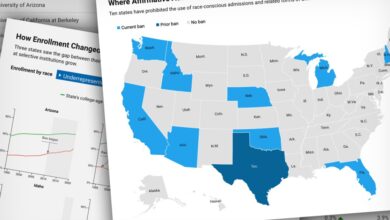6 Trends to Expect in The Education Sector

Image Source
Education is the backbone of a society, for it serves as the foundation on which societies are composed. Many countries have developed during the past 50 years by focusing extensively on education. There are also those who are suffering today because of not investing in this sector.
Like other sectors, education is also rapidly evolving, and many conventional trends have changed during the past 50 years. However, this pattern has accelerated in the digital age, and even more so during the coronavirus pandemic.
Technological inclusion in the education sector was proceeding gradually, but the pandemic forced various schools and colleges to make the transition immediately. This allowed them to continue their operations, and no time was lost as cities and countries remained under lockdown. In the aftermath of the Covid-19 pandemic, as nations continue to move towards normalcy, there are various trends in the education sector. This article looks at a few of these trends.
1) Online Learning
As mentioned above, the coronavirus pandemic accelerated the acceptance of online learning. With many renowned schools and colleges forced to shift to remote classes, online education stereotypes began to fade. People began viewing online education as credible as conventional in-person education. This also led to widespread acceptance of online degrees.
For example, there are various online degrees, like the popular MBA programs online, that are accepted just as much as conventional degrees. This comes as a sigh of relief for those who want to pursue their education but cannot commit to in-person classes. There can be various reasons for this, such as the time it takes to commute to the campus or time conflict with one’s primary job.
2) Distance Learning
While this is related to online learning, there are various differences here as well. While online learning implies that the entirety of the program or the course is completed remotely, distance learning leaves some room for face-to-face interactions. The students might have to attend in-person workshops or meetings. The conditions differ from institution to institution.
A person pursuing a research degree may be allowed to conduct their research independently and attend their classes remotely. However, the university may still require them to attend an in-person meeting on campus. This is a more balanced approach for those who want a taste of the conventional learning model.
3) Blended Learning
This is perhaps the most famous educational model in the world today. Blended learning combines the best of both worlds, and it allows schools and colleges to make education interesting for students who could easily absorb a lot of information surfing the internet. The blended learning model, which can be further subdivided into various other models, allows schools and colleges to incorporate the best aspects of conventional teaching methods and digital learning.
The instructor uses digital tools to teach their students. These digital tools can be used on campus, or the students can be given access to them for independent learning, which they can then undertake at their own pace. This makes learning more exciting and allows the students to take their time with it. So, the freedom to customize your own learning schedule makes it worthwhile.
4) Online Courses
Unlike traditional degree programs, online courses are a short-term commitment. Moreover, they can be attended online without the need for any in-person interaction. This allows many people to take short-term courses for the subjects they like. Besides, many people opt for online courses to enhance their skills or to learn new things.
During the coronavirus pandemic, online courses became all the more popular as people started taking them to boost their skills and credentials. Companies nowadays focus on skills more than credentials, especially at a time when they can hire people from across the globe. This allows people to focus on building their skills rather than pursuing conventional degrees. However, this does not in any way undermine the importance of a college degree in today’s world.
5) Alternative Credentials
This point may seem similar to the previous one, but it is actually a bit more expansive, considering that online courses are a part of this approach. A distinction has been made here because some people take online courses out of interest rather than out of a desire for alternative credentials. Therefore, this needs to be explained separately.
Many people pursue degrees in subjects they are interested in but find out midway that there are few jobs in those disciplines. Therefore, they begin to gain alternative credentials to boost their career prospects. For example, a person may be pursuing a degree in English Literature, and while that may be their passion, they may still learn different skills like coding.
6) Mobile Learning
Another popular trend in education these days is mobile learning. This could be seen as a culmination of various educational trends to make them more accessible to people. Since smartphones are getting more and more common worldwide, mobile learning has allowed people to access the latest learning material. This is even more important for developing countries where people who do not have the means to pursue quality education can still use their smartphones to learn new skills. This helps them enhance their career prospects and, in turn, allows them to improve their finances.
Various mobile applications can help people learn new things. There are numerous tools that teach technical concepts, such as programming in an interactive environment so that people can practice while learning as well. Of course, mobile learning can also be beneficial for those wishing to learn out of curiosity. Regardless of the motive, people can learn at their own pace. Not only has mobile learning made learning fun, but it has also made it more accessible.
Conclusion
There are various other trends in education these days, but we have listed a few here. Other trends include peer assessment and one-on-one tutoring. If you are a teacher, you might also want to look into these trends and see if you can incorporate them into your methods and techniques.






